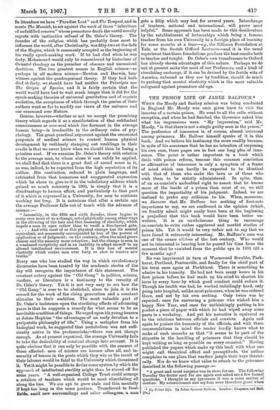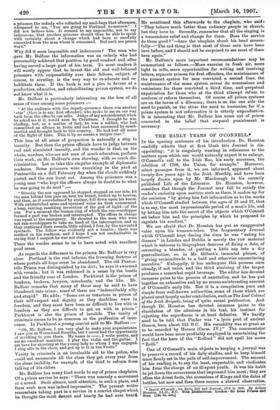THE PRISON LIFE OF TABEZ BALF01JR.*
WHEN the Moody and Sankey mission was being conducted in England Mr. Moody was once given leave to visit the inmates of a certain prison. He went to all the cells without exception, and when he had finished the Governor asked him what his impressions were. "My impression," said Mr. Moody, "is that there is not a single guilty man in the prison." The profession of innocence is, of course, almost universal among prisoners. Mr. Balfour himself speaks of it in this book. And we believe his testimony the more readily because, in spite of his assurance that he has no intention of reopening his own case, these pages are in fact one long plea of inno- cence. The point is rather important in a book which deals with prison reform, because this common conviction or affirmation of innocence is only a symptom of a frame of mind which can hardly be expected to be identical with that of those who make the laws or of those who wish them to be strictly administered. In spite, then, of an ex-conviet's undoubted right to assert that he knows more of the inside of a prison than most of us, we still question the impartiality of his judgment. Indeed, we are inclined to prefer any criticism to his. When, moreover, we discover that Mr. Balfour has nothing of first-rate importance to say, we are confirmed in the opinion (which, we frankly admit might easily have been at the beginning a prejudice) that this book would have been better un- written. It is an unwholesome thing to encourage ex-convicta to write rather aggrieved and morbid studies of prison life. Yet it would be very unfair not to say that we have found it extremely interesting. Mr. Balfour's case was one of the causes effibres of the last century. Who would not be interested in hearing how he passed his time from the moment that he vanished from the public eye in 1895 till a few months ago He was imprisoned in turn at Wormwood Scrubbs, Park- hurst, Portland, Pentonville, and finally for the chief part of his term once again at Parkhurst. There is something to admire in his tenacity. He had not been many hours in his first prison before he had made up his mind to shorten his term by every hour by which good conduct could reduce it. Though his health was bad, he worked unfailingly hard, only going into hospital, unlike most prisoners, when he was ordered there, and not by his own seeking. Only twice was he reported : once for answering a prisoner who wished him a happy New Year, and once for unthinkingly putting in his pocket a piece of paper with which he had wiped away some paste in a workshop. And yet his narrative is equivocal as to the relations between officials and convicts. Again and again he praises the humanity of the officials, and with these commendations in mind the reader hardly knows what to make of such remarks as that "it seems to be part of the etiquette in the handling of prisoners that they should be kept waiting as long as possible on every occasion." Having published the papers which make up this book with what one might call theatrical effect and promptitude, the author complains in one place that warders jangle their keys theatri- cally. Nor do we know what value to attach to the grievance described in the following passage :— " A great and cruel surprise was in store for me. The following Tuesday the doctor sent for me again and asked me a few formal questions. I thought in my ignorance it was a mere matter of routine. My astonishment and my fear were therefore great when • 3fy Prism Lifs. By Jab°. Spencer Balfour. London s Chapman and Hall. Naa
a prisoner, the orderly who collected my mail-bags that afternoon; whispered to me, You are going to Portland to-morrow.' I did not believe him. It seemed to me impossible, not to say indecorous, that another prisoner should thus be able to speak with certainty about a change which had been so carefully concealed from the man whom it concerned. But such are prison ways."
Why did it seem impossible and indecorous ? The man who gave Mr. Balfour the information was an orderly who had presumably achieved that position by good conduct and after having served a large part of his term. To most readers it will surely appear that to invest the old and well-behaved prisoners with responsibility over their fellows, subject, of course, to scrutiny, is the very way to re-educate and re- habilitate them. If the book is not a plea in favour of a productive, educative, and rehabilitating prison system, we do not know what it is.
Mr. Balfour is particularly interesting on the loss of all sense of time among some prisoners :— "At the audience with the deputy-governor there was another star' (that is to say, first offender), who spoke to me on our way back from the office to our cells. Judge of my astonishment when he asked me if it would soon be Christmas. I thought he was chaffing, but, as a matter of fact, he was a soldier, who had committed an offence in India and had been sentenced by court- martial and brought back to this country. He had lost all sense of the flight of time. This is by no means a unique ease."
This loss of all sense of proportion is naturally a step to insanity. But then the prison officials have to judge between real and simulated insanity, and the wonder is that, on the whole, warders, who are not men of much education, perform their work, on Mr. Balfour's own showing, with so much dis- crimination. Let us take this singular example of diplomatic madness. Some prisoners were exercising in the yard at Pentonville on a dull February day when the clouds suddenly parted and the sun burst out. Among the prisoners was a young man "who kept the officers always in doubt as to what he was going to do next" m-
" Directly the sun appeared he stopped, stepped on one side, let the man behind him pass on, beat his breast, looked up to heaven, and then, as if overwhelmed by ecstasy, fell down upon his knees. With outstretched arms and upraised voice he then commenced a long, ranting, rambling invocation of the god of light—of the sun. For a moment the human ring of which the sun-worshipper formed a part was broken and interrupted. The officer in charge was equal to the emergency. He shouted to the men who were not sun-worshippers to take no heed of the interruption, and so they continued their rounds, little edified, I fear, by the unwonted spectacle. The fellow was evidently not a lunatic ; there was method in his madness, and I hope I am not uncharitable in saying that I suspect he was not sincere."
There the warder seems to us to have acted with excellent good sense.
As regards the difference in the prisons Mr. Balfour is very clear. Portland is the real inferno, the frowning fortress at whose portals all hope must be abandoned. Time old Penton- villa Prison was distinguished by its dirt ; he says it swarmed with vermin ; but it was redeemed in a sense by the bustle and the friendly roar of London. Parkhurst is the prison of bankers, brokers, lawyers, merchants, and the like. Mr. Balfour remarks that many of these may be said to have blundered into crime; some of them are "indescribably silly and stupid." Be adds : "Some are as tenacious in prison of their self-respect and dignity as they doubtless were in freedom, and they must have been as difficult to live with in freedom as they are difficult to get on with in prison." Parkhurst is also the prison of invalids. The vanity of criminals seems to be as common as the profession of inno- cence. In Parkhurst a young convict said to Mr. Balfour :—
"Oh. Mr. Balfour, I am very glad to make your acquaintance. I saw you at Wormwood Bcrubbs, but I never had the opportunity of speaking to you there. My name is I write poetry, and am an excellent musician. I play the violin and the guitar. I am here for shooting at the young lady to whom I was engaged. I sing alto in the choir, and get up to Gin the Venite."
Vanity in criminals is an invaluable aid to the police, who could not enumerate all the clues they get every year from the sheer inability, for example, of the thief to refrain from talking of his riches.
Mr. Balfour has many kind words to say of prison chaplains. Of a prison service he says : "There was scarcely a movement or a sound. Such silence, such attention, in such a place, and from such men was indeed impressive." The present writer remembers taking part in a service in a convict chapel which he thought the most devout and hearty he had ever heard. He mentioned this afterwards to the chaplain, who said: "They behave much better than ordinary people in church, but they hare to. Secondly, remember that all the singing is a tremendous relief and change for them. Does the service do them good P "—here the chaplain shook his head mourn- fully.—" The sad thing is that most of these men have been here before, and I should not be surprised to see most of them here again."
Mr. Balfour's more important recommendations may be summarised as follows :—More exercise in fresh air, more light in cells, more opportunities for writing and receiving letters, separate prisons for first offenders, the maintenance of the present system for men convicted a second time, the maintenance of the same system minus its concessions and remissions for those convicted a third time, and perpetual expatriation for those who at the third attempt refuse to conform or reform themselves. Of course all prison systems are on the horns of a dilemma; them is on the one side the need to punish, on the other the need to humanise, for if a prison system is not reformative it is utterly unproductive. It is interesting that Mr. Balfour has come out of prison converted to the belief that corporal punishment is necessary.











































 Previous page
Previous page